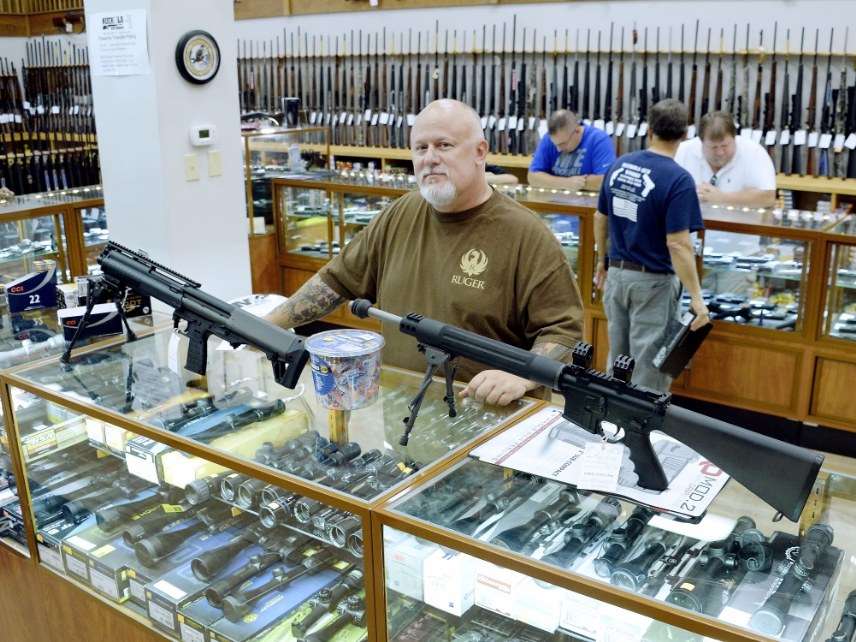Are We Experiencing Peak Gun Rights?
A look into a more restrictionist future for the Second Amendment.

We may have reached peak gun rights.
History could very well record that in the modern era, the Second Amendment received its most generous reading in 2010 when the U.S. Supreme Court decided its last major case, and that gun rights have been declining ever since.
This prospect is as worrisome for anyone who takes an expansive view of the Second Amendment as it must be exhilarating for anti-gun advocates.
Since 2010, residents of California, New York, Massachusetts, Connecticut, Washington, Colorado, Oregon—and states with similarly minded legislatures—have found themselves slapped with new restrictions that did not exist eight years ago. The U.S. Supreme Court has done precisely nothing to stop this extra-constitutional adventurism.
Meanwhile, attempts to liberalize gun laws in the U.S. Congress have run aground. The U.S. House of Representatives approved concealed carry reciprocity last year, but both it and a related bill remain stuck in the Senate. A hearing protection bill, modeled after similar laws in Norway and Denmark that deregulated suppressors for firearms, has been waiting for a House vote since last September. So has another House bill that would curb overly broad state and local restrictions on rifles and shotguns.
After President Trump's brainstorming session with Sen. Dianne Feinstein (D-Calif.) this week about new firearm restrictions, the political outlook has darkened. Instead of working to advance pro-gun rights legislation, however fitfully, Second Amendment supporters are now trying to imagine what form a restrictionist proposal—possibly written by Feinstein, author of its 1994 ancestor—might take, and precisely how confiscatory it will be. (Trump's remarks also invite speculation about what kind of Supreme Court justice he might appoint, should another vacancy happen.)
Trump seemed to backpedal on Twitter yesterday morning, and later announced that he had a "great" meeting with the National Rifle Association that evening. Perhaps he was reminded that, if gun owners choose to sit out the 2020 election, this particular chief executive should not expect a second term. But without clear direction from the White House, and without a president willing to devote the energy required to advance good legislation, the Second Amendment's legal protections are likely to continue to shrink.
Most of the blame should land on the shoulders of a supermajority of the current Supreme Court justices. In the 2008 District of Columbia v. Heller and 2010 McDonald v. City of Chicago cases, the court declared the Second Amendment to be a fundamental constitutional right that states and municipalities must respect. After that pair of decisions, courts were supposed to review laws restricting gun rights with the same reflexive skepticism as they would laws that restrict free speech or abortion.
That did not happen. A series of lower courts, in particular the U.S. Court of Appeals for the 9th Circuit, creatively interpreted those important rulings into near-nullities—effectively overruling the Supreme Court. Bizarrely, at least six justices have decided to let them: it takes four votes to accept an appeal to overrule a lower court, and those four votes have not been forthcoming.
"If a lower court treated another right so cavalierly, I have little doubt that this Court would intervene," Justice Clarence Thomas wrote in last week's dissent from his colleagues' decision not to hear the Silvester v. Harris case from the 9th Circuit. "But as evidenced by our continued inaction in this area, the Second Amendment is a disfavored right in this Court… The right to keep and bear arms is apparently this Court's constitutional orphan." (Justice Neil Gorsuch joined Thomas in another dissent last year that made a similar point.)
To be sure, some states have veered in the other direction. Texas, Kansas, and New Hampshire are among those that have liberalized their laws, typically relating to carrying firearms. But the grassroots wins during the last eight years have been dwarfed by the losses. New York state banned magazines that can hold more than seven rounds of ammunition, belatedly realizing that seven-round magazines for many models of firearms may not exist. California residents now may no longer buy ammunition without submitting themselves to a background check. They can't even loan firearms to someone they know, creating a challenge for instructors who would like to lend students a .22 caliber rifle.
Reversing this process will not be a trivial task. "If the Supreme Court continues to duck these cases, a constitutional amendment might be the only civil option left," says Brandon Combs, president of the Firearms Policy Coalition. Combs says a federal law preserving national carry reciprocity is crucial, predicting that without such a measure, "I don't think the Second Amendment culture can survive."
Technology may step in where law falls short. Hobbyists have long built AR-15 rifles (including the so-called lower receiver, which is what the law views as a firearm) in garages using drill presses or other shop tools. Advances in 3D printing and CNC machining in the form of Defense Distributed's Ghost Gunner make creating guns in your own home much easier—though state governments are responding with new registration requirements. California's takes effect this summer; widespread non-compliance is likely.
"I think people are tired," says Combs, who was also one of the two plaintiffs in the California lawsuit the Supreme Court refused to hear last week. "There are a lot of gun owners out there. There are a lot of new gun owners. But they feel like it doesn't matter. If the Supreme Court isn't going to do anything about it, people aren't going to comply. They don't care about activism. They just won't comply."


Show Comments (239)